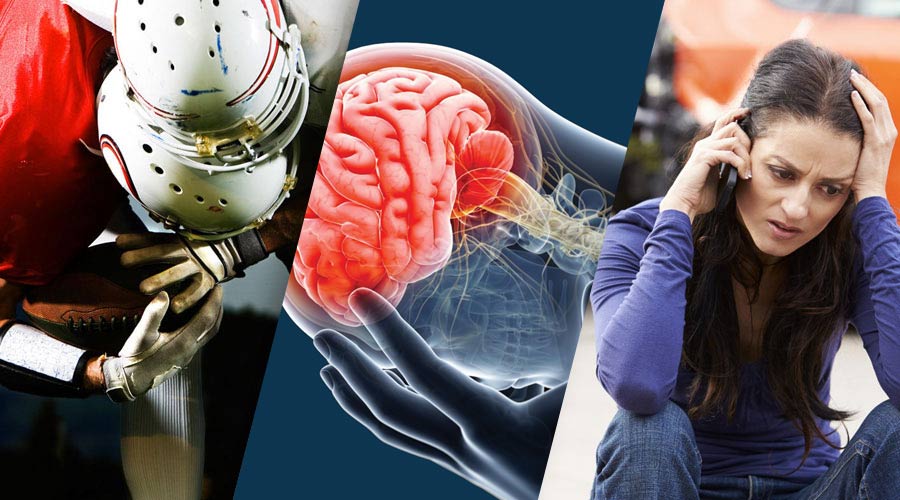If there were only one number to gauge your overall health, fitness, and longevity, it would be...
What is a Traumatic Brain Injury?

The brain is surrounded by cerebrospinal fluid that usually protects it from impact. However, if there is a significant force applied to the head or a rapid change in acceleration or deceleration, the brain tissue can stretch or tear, causing a traumatic brain injury, commonly referred to as a TBI.
Concussion = Traumatic Brain Injury
All concussions, whether they are mild, moderate, or severe, are also traumatic brain injuries. Symptoms of a severe traumatic brain injury or concussion can include severe motor disturbances such as paralysis of the lower or even entire body—paraplegia or quadriplegia, respectively—as well as the inability to eat, swallow, or speak. Mild to moderate symptoms of a traumatic brain injury can include memory loss, blurred vision, trouble speaking, constant headaches, and other side effects, such as the inability to focus. As a result, it certainly is cause for concern.
Some causes of traumatic brain injury can include:
- Car or motorcycle accidents
- Falls
- Sports-related injuries
- Any activity that can cause trauma to the head
This kind of injury can happen to anyone. Although we oftentimes hear about athletes, specifically football, soccer and hockey players, who have suffered numerous concussions over the course of their athletic careers, traumatic brain injuries are the most common cause of disability in people under 45 years of age worldwide. (For those who are over 45, the number one cause is stroke.)
What is Concussion Recovery
Veterans, in particular, have been particularly impacted from what is known as the "Signature Wound" of the wars in Iraq and Afghanistan, making it more difficult for them to adjust to everyday life once they return home.
In 2016, according to the Defense and Veterans Brain Injury Center, a branch of the U.S. Military Health System, 357,048 service members were diagnosed with traumatic brain injuries. However, other reports have estimated this figure to likely exceed 600,000 current and former servicemen and servicewomen because of what is thought to be a significant number of cases that go unreported or undetected.
Unfortunately, the effects of traumatic brain injury, especially the symptoms of aggression, depression and resulting substance abuse, are a major factor contributing to the approximately 20 veterans committing suicide each day in the United States.
A recent study even reports that traumatic brain injuries may do more harm than we initially thought. The research team, led by Daniel Perl—a neuropathologist at the federally run Uniformed Services University of the Health Sciences—has found a connection between brain damage caused by blast force and post-traumatic stress disorder. “The implications of this finding are profound," the study said, "pointing to the possibility that symptoms long thought to be psychological—ascribed to post-traumatic stress disorder (PTSD)—may instead be direct results of physical damage to the brain.”
As a result, diagnosing those who have suffered from this impairment and providing them with the best possible tools for recovery is essential.
HOW DO YOU RECOVER FROM A TRAUMATIC BRAIN INJURY?
As mentioned above, traumatic brain injuries have many causes and ranges of severity. Consequently, the path to recovery varies depending on the individual. Although there has been an improvement in diagnosing and preventing this condition, not all treatment options prove to be that effective. Too often doctors default to advising their patients to simply rest in a dark room until their symptoms subside.
Even worse, veterans especially, are oftentimes prescribed anti-depressants, anti-psychotics, anti-anxiety medications, narcotics and other drugs to control their symptoms, but none of these drugs are FDA-approved to treat a traumatic brain injury or concussion. These drugs do not heal the underlying brain injury and are also potentially dangerous, secondary to side effects that include addiction or even suicide.
However, there is a safe, non-invasive traumatic brain injury treatment that you may not have heard of before, but is increasingly being used with much benefit: hyperbaric oxygen therapy (HBOT).
HBOT is an advanced wound-healing technology that can naturally heal the body from the inside out. It can heal wounds no matter where they are, including those in the brain caused by a traumatic brain injury.
Sitting or lying in a hyperbaric chamber, a patient undergoing a HBOT session simply breathes in pure oxygen for 30 to 60 minutes. It aids the body by decreasing any inflammation and swelling present in the brain and by creating new blood-vessel growth. This process helps bring nutrients to damaged tissue, which promotes neurologic tissue regeneration. And in recent years, several studies have shown the potential power of HBOT to heal traumatic brain injuries and concussions.
HBOT can also help:
- Improve sleeping patterns
- Reduce irritability and fatigue
- Increase one's ability to concentrate and remember things
- Decrease feelings of dizziness
- Decrease headaches
Visiting a trained medical professional for a consultation can help determine if HBOT is right for you. At Hyperbaric Medical Solutions, not only do we provide HBOT to those who have suffered from brain injuries, but we have also created our Veteran's Program. Veterans who qualify for this program can receive HBOT at no cost.*
Find out more about what hyperbaric oxygen therapy is.
*All prospective patients must be medically cleared by an HMS physician prior to beginning treatment and must be flexible in scheduling treatments. Although many individuals have been treated with HBOT for TBI and PTSD, HBOT remains an investigational, or off-label, treatment for TBI and PTSD. Results may vary. HMS makes no guarantees about the outcome of treatment. While there is no out-of-pocket responsibility to the veteran, HMS reserves the right to accept payment from other sources, including, but not limited to, insurance companies, government payers, non-profit organization, and/or other donations.

Written by Alan Katz, MD, FUHM, FACEP, FAAEM
Dr. Alan Katz, National Medical Director of Hyperbaric Medical Solutions (HMS), is double board certified in Emergency Medicine and Hyperbaric Medicine. He directs clinical operations, education and research initiatives, and the integration of other regenerative medicine therapies....
Read More



